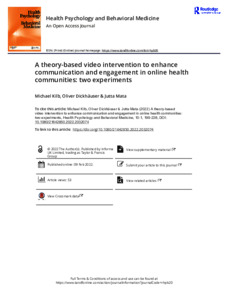|
A theory-based video intervention to enhance communication and engagement in online health communities: Two experiments
Kilb, Michael
;
Dickhäuser, Oliver
;
Mata, Jutta
![[img]](https://madoc.bib.uni-mannheim.de/61408/1.hassmallThumbnailVersion/A%20theory%20based%20video%20intervention%20to%20enhance%20communication%20and%20engagement%20in%20online%20health%20communities%20two%20experiments.pdf)  Vorschau |
|
PDF
A theory based video intervention to enhance communication and engagement in online health communities two experiments.pdf
- Veröffentlichte Version
Download (3MB)
|
|
DOI:
|
https://doi.org/10.1080/21642850.2022.2032074
|
|
URL:
|
https://madoc.bib.uni-mannheim.de/61408
|
|
Weitere URL:
|
https://www.tandfonline.com/doi/figure/10.1080/216...
|
|
URN:
|
urn:nbn:de:bsz:180-madoc-614082
|
|
Dokumenttyp:
|
Zeitschriftenartikel
|
|
Erscheinungsjahr:
|
2022
|
|
Titel einer Zeitschrift oder einer Reihe:
|
Health Psychology and Behavioral Medicine
|
|
Band/Volume:
|
10
|
|
Heft/Issue:
|
1
|
|
Seitenbereich:
|
199-228
|
|
Ort der Veröffentlichung:
|
London
|
|
Verlag:
|
Routledge
|
|
ISSN:
|
2164-2850
|
|
Verwandte URLs:
|
|
|
Sprache der Veröffentlichung:
|
Englisch
|
|
Einrichtung:
|
Fakultät für Sozialwissenschaften > Gesundheitspsychologie (Mata 2015-)
|
|
Bereits vorhandene Lizenz:
|
 Creative Commons Namensnennung 4.0 International (CC BY 4.0) Creative Commons Namensnennung 4.0 International (CC BY 4.0)
|
|
Fachgebiet:
|
150 Psychologie
|
|
Freie Schlagwörter (Englisch):
|
social networking sites , online communities , behavior change interventions , need-support , self-determination theory
|
|
Abstract:
|
Background
Online communities and social networking sites have great potential for supporting health behavior change. However, interventions vary greatly in participants’ engagement rates and, consequently, their effectiveness. Theory-based interventions in real-world contexts are needed to further increase engagement and effectiveness.
Methods
We experimentally tested whether a video intervention teaching Self-Determination-Theory-based communication strategies increases need-supportive communication strategy use over one week (Study 1, N = 76) and perceived need support, engagement, and goal attainment in a behavior change intervention supported by a forum-based online community (Study 2, N = 537). In Study 2, participants chose a goal (increasing either fruit or vegetable consumption or increasing moderate or vigorous physical activity) and joined an online community for 2 weeks. Data from both experiments were analyzed with mixed models and follow-up tests.
Results
In Study 1, participants in the intervention but not in the control group showed an increase in the number of need-supportive communication strategies used both immediately and one week after the intervention (condition × time interaction, partial η2 = 0.31). In Study 2, participants who watched the intervention video had a higher number of postings and reported a higher subjective forum use frequency (but not a higher number of logins) compared to participants who watched the control video. However, the effect on the subjective forum visit frequency was not robust. There were no intervention effects on perceived need support, goal attainment, or secondary outcomes. The results might be explained by low application of need-supportive communication strategies.
Conclusion
A brief video intervention may be a suitable, low-cost intervention to promote need-supportive communication strategy use, benefitting both engagement and behavior change. Future studies should incorporate additional means to further improve communication strategy uptake and engagement in online communities.
|
|
Zusätzliche Informationen:
|
Online-Ressource
|
 | Dieser Eintrag ist Teil der Universitätsbibliographie. |
 | Das Dokument wird vom Publikationsserver der Universitätsbibliothek Mannheim bereitgestellt. |
 Suche Autoren in Suche Autoren in
Sie haben einen Fehler gefunden? Teilen Sie uns Ihren Korrekturwunsch bitte hier mit: E-Mail
Actions (login required)
 |
Eintrag anzeigen |
|
|
 ORCID: 0000-0001-9751-2499 ; Dickhäuser, Oliver
ORCID: 0000-0001-9751-2499 ; Dickhäuser, Oliver  ORCID: 0000-0002-3126-8398 ; Mata, Jutta
ORCID: 0000-0002-3126-8398 ; Mata, Jutta  ORCID: 0000-0003-2498-5054
ORCID: 0000-0003-2498-5054



 Creative Commons Namensnennung 4.0 International (CC BY 4.0)
Creative Commons Namensnennung 4.0 International (CC BY 4.0) Suche Autoren in
Suche Autoren in